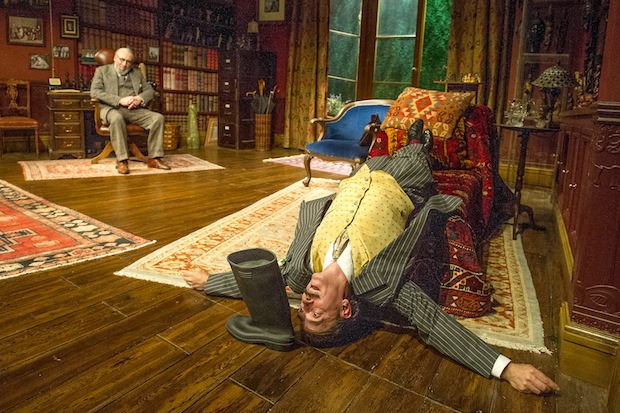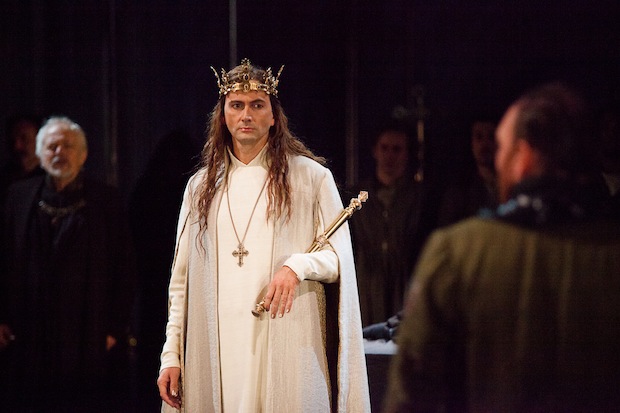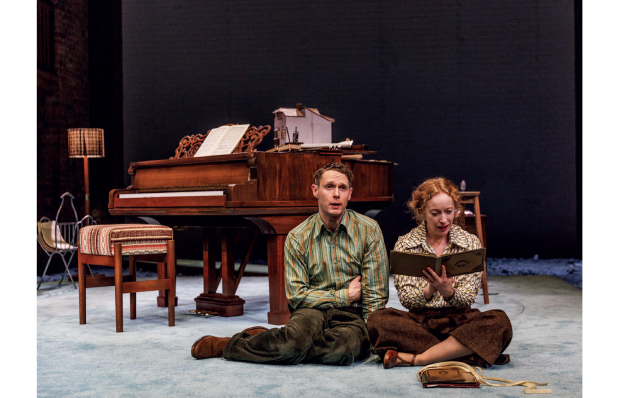Ah yes, Candide, the adventures of an innocent abroad in ‘the best of all possible worlds’, as philosophers of the 18th century liked to insist. Voltaire’s satirical demolition of the higher nonsense of his age, and of the powers of Church and state who propped themselves up with it. A novel of 1759 written, at least in part, as an outraged response to those who’d insisted that the earthquake that had razed Lisbon to the ground four years earlier was all part of God’s plan for the good of mankind. Two centuries later, a brilliant musical by Leonard Bernstein. And now, a new play by Mark Ravenhill, mitigating the theft of the title by adding ‘inspired by Voltaire’.
‘Inspired’ turns out to be the right word. For Ravenhill has written a cracker of a play that redirects Voltaire’s mockery against the phoney hopes keeping so much of the world afloat (just) today. There’s no shortage of good journalists exposing the vacuity of the Good News, but we need the artful scalpels of the cartoonist and the satirist to cut to the quick. No better weapon than laughter, and the Swan was awash with it on the first night. Voltaire would have been hoping for tears too, but he can’t have it all. This would also apply to the half-hearted musical numbers, though Lyndsey Turner’s direction is otherwise perfectly in tune with the play.
In an evening full of surprises, Ravenhill begins in the bewigged high society of Voltaire’s time with the old gambit of a ‘play within a play’. Matthew Needham’s lankily disgruntled Candide has taken to his bed to escape the amorous attentions of his host, the Countess. He’s rudely awoken to witness the performance of a play which the Countess hopes will flatter and win him round. Not so, for Candide is appalled that his diary has been plundered for the play (‘You have stolen my life and used it to torment me’) and vexed that an actress purporting to be Cunégonde, lost love of his life, is not the actual lady herself. Illusion and reality already confounded.
And at this point, just when you’re beginning to wonder how on earth Ravenhill can sustain this mildly tiresome pastiche of 18th-century theatre, he ricochets you into a bang-up-to-date birthday party from hell. The birthday girl (Sarah Ridgeway), maddened by her family’s congratulatory speeches (‘you chose the best of all possible mums and dads’), shoots them one by one (‘the planet’s fucked ’cos we breed like rabbits — let the cull begin’). She leaves herself till last, sparing only her mother Sarah to tell the tale.
The second half of the play is largely about how, in order to make a film with a happy ending, Sarah’s account of the massacre is manipulated by a screenwriter to the point where Sarah herself is swept up into being complicit in the mendacity. Superbly played by Katy Stephens, Sarah comes to realise she’s been tricked, angrily insisting that any life worth living involves accepting the truth of pain and suffering — and of course she’s considered utterly mad.
Although it’s Sarah’s story that’s taken over (she’s the only character who isn’t a caricature), Ravenhill keeps up his cross-play across the centuries. Candide’s wickedly funny visit to El Dorado — no laws, no wars, no king, no god, just loads of useless gold — points up the much sharper humour of the scene in the film producer’s office. Along the way are woven in episodes in which idiocies of our modern feelgood balloon (a debt-fuelled fantasy fuelled by ‘greed, greed and greed’) are pricked amusingly and usually without too much preaching. Whenever you begin to feel uncomfortably close to Shaw’s pontification in Back to Methuselah, Ravenhill swoops in and whisks you away.
In the final scene, set in the pharmaceutical research institute of Dr Pangloss (the excellent Ian Redford), he reunites Candide, cryonically preserved and still youthful, with a 400-year-old Cunégonde distressingly aged by centuries of revolutions and wars and global spoliation. Her speech, movingly delivered by Susan Engel, bitterly validates the Voltairean critique of any Utopian world-view, at last earning from the now totally disenchanted Candide the kiss she has craved. A marriage is proclaimed by the incorrigible Pangloss, but it’s the appalled Sarah who must end the play: ‘Optimism,’ she concludes, ‘a system of cruelty with a comforting name.’ Could she also have meant the Panglossian attempts to immortalise the European Union, or the platitudinous posturings of our political and financial leaders? It seems certain that no one will pay the least attention, but that’s very much part of Ravenhill’s ingenious and enjoyable take on Voltaire.
Got something to add? Join the discussion and comment below.
Get 10 issues for just $10
Subscribe to The Spectator Australia today for the next 10 magazine issues, plus full online access, for just $10.
You might disagree with half of it, but you’ll enjoy reading all of it. Try your first month for free, then just $2 a week for the remainder of your first year.













Comments
Don't miss out
Join the conversation with other Spectator Australia readers. Subscribe to leave a comment.
SUBSCRIBEAlready a subscriber? Log in